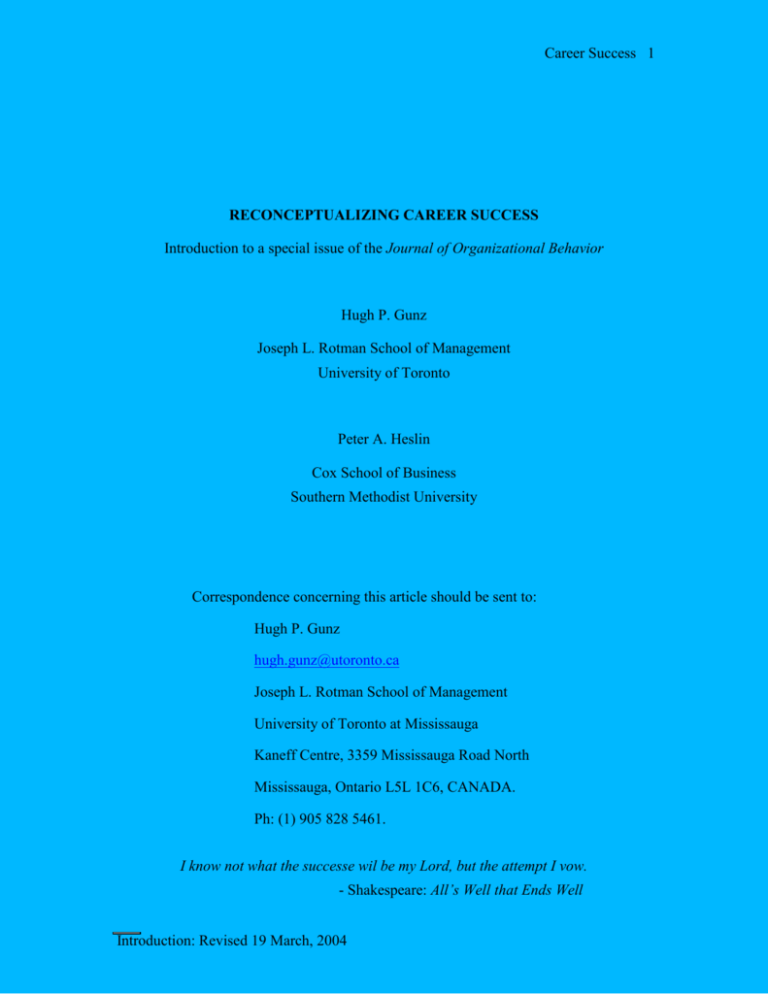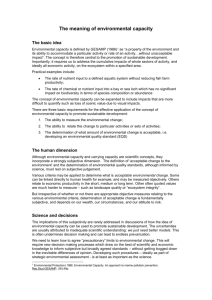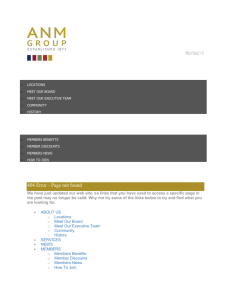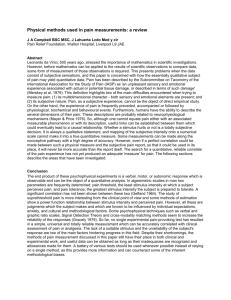unpacking and reconceptualizing career success
advertisement

Career Success 1 RECONCEPTUALIZING CAREER SUCCESS Introduction to a special issue of the Journal of Organizational Behavior Hugh P. Gunz Joseph L. Rotman School of Management University of Toronto Peter A. Heslin Cox School of Business Southern Methodist University Correspondence concerning this article should be sent to: Hugh P. Gunz hugh.gunz@utoronto.ca Joseph L. Rotman School of Management University of Toronto at Mississauga Kaneff Centre, 3359 Mississauga Road North Mississauga, Ontario L5L 1C6, CANADA. Ph: (1) 905 828 5461. I know not what the successe wil be my Lord, but the attempt I vow. - Shakespeare: All’s Well that Ends Well Introduction: Revised 19 March, 2004 Career Success 2 A cursory search of the literature yields literally thousands of books and articles about career success in one form or another. Even when the search is narrowed to social science journal articles combining “career” and “success”, well over 1000 “hits” can be obtained from sources such as ISI’s Social Sciences Citation Index and PsycINFO. Perhaps this should not be any great surprise, considering how central the word "success" is to life in Western society. Few questions stop one in one's tracks as effectively as: “Am I successful?”, "Have I been a failure?", or "What has been the price of my success?" Career success, then, looks as if it is much studied and well-understood. So why this special issue? One reason is hinted at by the quotation at the head of this introduction. Shakespeare’s use of the word “success” is ambiguous, as befits its derivation from the Latin: succedere, to succeed or follow (Webster, 1996). This ambiguity has been with it since at least the sixteenth century (OUP, 1989). Success, in the sense of “follow,” can be that which happens, in other words the upshot of events, either good or bad. But, also since the sixteenth century, it has also meant something more explicitly positive: “[t]he prosperous achievement of something attempted; the attainment of an object according to one's desire: now often with particular reference to the attainment of wealth or position” (ibid). Success, then, can either be a consequence or a favourable outcome, two very different things. Most people probably think of it in its latter sense, with the implication that lack of success is something they don’t want to experience. But it is important not to forget its broader meaning. It is well known that what is seen by some people as success in the sense of a good outcome, can look quite the opposite to others (cf. Bartolome & Evans, 1980). So while it is certainly interesting to study the factors that lead to career success in the sense of prosperity, it is every bit as Introduction: Revised 19 March, 2004 Career Success 3 interesting, if not more so, to study how people decide that a given outcome was, indeed, “prosperous.” Success as outcome, therefore, is arguably the meta-concept to success as prosperous achievement, and although “success” will typically be used here in its sense as the antonym of “failure”, the context in which the discussion takes place is of success as the outcome of one's career. Things happen to people in their working lives; the interesting thing is how they and others evaluate these outcomes as “good” or “bad”, and how these evaluations might shift over time. What do we mean here when we use the word “career”? Once again, we end up in a fog of ambiguity. “Career” descends from the Latin carraria, meaning a carriage-road or road (OUP, 1989). Although it has come to mean “[a] person's course or progress through life (or a distinct portion of life)” (ibid), there is a vast and fascinating gulf between the story people tell themselves about their career, and the “actual” course over which the person travels during his or her career. Is a career primarily the story of the way the person interprets the meaning of what she or he has done and the things that have happened to him or her – the so-called “subjective” career (Hughes, 1937)? Or is it mainly a map of the social territory they have traversed, for example the schools they have attended, the jobs they have held, the honours that have been conferred on them (the “objective” career)? Who has careers? Is it a property of someone in “professional life or employment, which affords opportunity for progress or advancement in the world” (OUP, 1989), or can it be anyone? These are, of course, old questions which have been answered in many different ways (Arthur, Lawrence, & Hall, 1989). But it is worth revisiting them, because when the two constructs – success and career – are brought together, the ambiguities that are at the root of each raise intriguing questions. If success is the (positive or otherwise) Introduction: Revised 19 March, 2004 Career Success 4 consequence of something, then (a) what is the something that should be focussed on? (b) Who should do the focussing? and (c) How should we calibrate our measurement instruments? Indeed, the stimulus for the present collection of papers was our sense of disquiet about the extent to which these three issues have been thought through. We shall look at each in turn. On what something do we focus? We have already referred to the “great divide” in careers scholarship between the subjective and objective career. Its influence is pervasive in the literature and is at the root of what is sometimes presented as a methodological question: which variables should be included in our study? Should we be looking at the “objective” outwardly-visible manifestations of success, for example compensation, how “high” up the hierarchy the person has climbed by a given age, or how many resources the person has at his or her command? Alternatively, should we be concentrating on the “subjective” issue of how people feel about their experience of work over the course of their working lives? It is one thing to point out, as many have, that these are different questions which yield different answers when asked of the same person (e.g., Judge, Higgins, Thoresen, & Barrick, 1999). But it is equally important to keep in mind the relationship between the two. Does, for example, objective success necessarily imply subjective success, and vice versa? Or is the converse – that success in one comes at the cost of success in the other – equally possible? Alternatively, might the two constructs be largely unrelated, either because people are capable of transcending their concern with objective outcomes, or because they manipulate their feelings of subjective success in the light of their objective situation (in other words, finding ways of feeling good about situations that, on the face of it, are ‘bad’)? These themes are explored in different ways in the papers that follow. Introduction: Revised 19 March, 2004 Career Success 5 Who does the focussing? When we ask someone to rate, on some kind of scale, how “successful” they feel their career to have been, we are making a huge number of presumptions and assumptions. In a nutshell, we are presuming that our understanding of the concepts of “success” and “career” are valid ways of making sense of other peoples’ experience of work. We are also assuming that our informants share our understanding of “career success”. There is a distinction, in other words, between what we call here the subjectivist and objectivist approaches, a distinction which is different from the traditional subjective/objective contrast. Most research and scholarship on career success is objectivist, in the sense that the scholar takes it upon him/herself to define the construct in terms that he or she believes are valid for, and make sense to, the people who are the object of his or her scholarship. But this is an heroic assertion. There is an alternative viewpoint: that it is up to the scholar’s informants to decide what, if anything, the terms “career” and “success” mean for them. This is what we call a subjectivist perspective. So, for example, if we were studying the subjective careers of a group of people, an objectivist approach might involve asking questions about outcomes such as job satisfaction, intention to quit, job involvement, satisfaction with career progress to date, and anticipated career progress (e.g. Burke & McKeen, 1995). A subjectivist approach, by contrast, asks the subjects for their definitions of what success means to them, before analyzing the results using either qualitative (e.g. Gersick et al., 2000; Juntunen et al., 2001) or quantitative (e.g. Heslin, 2003; Hofer et al., 1994) approaches. As one of our reviewers pointed out, the subjectivist approach leads the researcher naturally into the way subjects’ perspective on success is affected by their life situation (for example how close to retirement they may be, their family commitments – single parent, primary caregiver to elderly parents, dual income/no kids – or their health). Introduction: Revised 19 March, 2004 Career Success 6 As we shall see, this distinction animates much of the debate that takes place in the papers in this collection. How should we calibrate our instruments? In addition to the complex issues of what constitutes career success and who does the measuring, we also need a scale with which to collect our findings. How much success does it take to constitute success? Where do the scale calibrations come from? Even if one were to adopt completely a subjectivist position and assume that the focal person alone decides on their success criteria, we have said nothing about the processes by which they make the selection. Are they guided purely by internal standards, such that they decide not only what matters to them, or do they derive their standards by comparing themselves with others (Festinger, 1954; Heslin, this issue)? How easy is it for people to develop their ‘own’ standards in the face of pervasive social influences (Bandura, 1986)? Also, how much of “it” – for example, level of management, salary, scope of responsibilities, reputation – counts for them as “success”? A key argument for focussing on the subjective career often goes along the following lines: careers have changed dramatically in the past few decades, so it is much harder to do well using hitherto conventional indices of success. For example, organizations have got much flatter than they were, so there is much less chance now of climbing hierarchical ladders. Therefore, the argument continues, one should strive to define and redefine success in one’s own terms, whatever they might be (Hall, 2002). But careers are not free of social context (Higgins, 2001); to what extent is any such shift simply a process of rationalization, a kind of cooling-out (Goffman, 1952) in which the focal person colludes with colleagues, family, friends and significant others to readjust their view of their careers, so that they can come to terms with their (comparative or Introduction: Revised 19 March, 2004 Career Success 7 otherwise) failure (Nicholson & de Waal Andrews, this issue)? Who, in other words, controls the way success is seen and experienced? These three themes are explored in this special issue from a variety of angles. All papers deal with the first, the subjective/objective distinction, but each has its own particular focus on the second and third themes. The papers had their origins in a symposium held at the 2002 annual meeting of the Academy of Management. We invited a small group of distinguished careers scholars to reflect on the meaning of career success, and the papers that emerged displayed a fascinating complementarity. We invited the authors to work more on their ideas, and JOB agreed to publish them; the following collection is the result. Heslin opens the present exploration into the complexity of career success. First, he observes that within the extensive literature on the antecedents of “career success”, there has been a paucity of attention paid to the nature of the success criterion. Evident deficiencies in how both objective and subjective career success have typically been operationalized leads to some suggestions for improved measurement. Specifically, Heslin argues that scholars should focus on a broader range of objective and subjective success criteria, guided by theory and research regarding the career concerns and context in which the focal population enact their careers. Continuing with this decidedly subjectivist focus, he then draws attention to how the social comparative nature of subjective career success has rarely been systematically addressed in the way that this construct is conceptualized and assessed. Both contextual factors, such as winner-take-all markets and organizational culture, as well as individual factors, such as work orientation and goal orientation, are shown to potentially influence the type of criteria that are most salient to people when they evaluate their careers. Empirical tests of the related Introduction: Revised 19 March, 2004 Career Success 8 propositions may inform theory and research regarding how different individuals and groups tend to construe and evaluate their career success. For Nicholson and de Waal Andrews, the objective/subjective career distinction is important, but also potentially a major source of misinformation. Their starting point is the primacy of the objective career, and their aim, inter alia, is to “help people to avoid the obfuscation of careers through ideologies that present subjective success as a substitute of equal value and functionality to objective success.” They accept that there are plenty of people who seem quite content despite not appearing to have succeeded in life (low objective success but high subjective success), as well as some for whom high objective success leaves them still striving and unfulfilled (high objective success, low subjective success). However much of the contentment of the former group springs, they argue, from “what one could call an [evolutionarily-functional] inner rhetoric of selfregulation … [an] ex-post rationalization of experienced success or failure [that] is the stuff of career sense-making”. Rather than playing into this bump-smoothing defence mechanism (which they compare to social ideologies that reconcile the oppressed to their oppression), Nicholson and de Waal Andrews make a case for examining the different facets of objective success, some of which may be more strongly intercorrelated than others. The pattern of correlations, they argue, can also be expected to vary across the lifespan and in response to a variety of other contingencies. Understanding the rules of the game, they maintain, is critical to being able to design effective career strategies. Hall and Chandler take a contrary, subjectivist view. For them the individual should indeed be in charge of the choice about the extent to which the subjective career takes primacy in the objective/subjective success balance; indeed, at its most profound, career success is about careers for which the objective becomes comparatively unimportant. Introduction: Revised 19 March, 2004 Career Success 9 Hall and Chandler explore the connection between objective and subjective success, characterizing the latter in terms of psychological success. They describe a cyclical model of the process by means of which objective success can be turned into psychological success, in turn setting the scene for further objective success. But there are circumstances under which the loop is broken: for example, objective success may lead to psychological failure being experienced; significant episodes of personal growth (“subjective success”), if unmatched by objective success, can lead to the same outcome. By contrast, success is most felt, argues Hall and Chandler, when the career is a calling, deriving from a sense that one has been “put here to serve an important purpose in service to others.” What matters most to the focal person is his or her own evaluation; “[a]s the person evolves to higher levels of identity awareness and integration, the correlation between measures based on the objective career and those based on the subjective career will decrease.” In other words, the ultimate career success for Hall and Chandler is a dissociation of objective and subjective careers, such that, as their careers progress, people become comparatively indifferent to their objective success. What matters to them is the success with which they follow their calling and the extent to which they see their work as “serving a wider community in the world.” Arthur, Khapova and Wilderom step aside from the objective-subjective debate and examine what we have called here the objectivist-subjectivist issue. They identify two main “gatekeepers” to the concept of “career success”, individual career actors and the institutions that employ them. Yet, they point out, “neither of these parties directly determines what kind of research gets conducted or why. Such choices are made by the researchers who bring their own definitions of career success to their work … [and] by those reviewers who determine whether any subsequent report of research results will be Introduction: Revised 19 March, 2004 Career Success 10 accepted for academic journal publication” (cf. Magueijo, 2003). A brief review of a number of key assumptions underpinning the way scholars currently view career success leads them to a similar conclusion to that of the preceding two papers; namely, that understanding the interaction between subjective and objective careers is crucial. Yet a search of the previous decade’s empirical literature on career success evinced more acknowledgement of the duality than of the two-way interdependence, and most of the articles that do examine the interdependence, focus mainly on the mentor—protégé relationship. Furthermore, echoing the theme raised in Heslin’s paper, there was little evidence that the success criteria used in the research that Arthur et al. examined had much theoretical basis. They draw the inference that those of us who study and write about career success should be doing better. The gap between theory development and empirical examination needs to be bridged if our role as gatekeepers is to be helpful to the constituencies we purport to address and help. Where does this collection of papers leave our understanding of career success, and what directions does it suggest for future research and scholarship? We first need to emphasize that we are not claiming to have generated a comprehensive interpretation of career success, nor are we arrogating to ourselves the job of specifying the future lines of inquiry for others to follow. As we explained above, the papers were written by a small group of invited scholars, and we were fascinated by their complementarity. But complementarity does not imply comprehensiveness. If anything stands out from this collection, it is that there is a lot we do not understand about the multifaceted nature of career success. Thus, we are not merely making the conventional plea for further research to uncover the effects of a particular group of variables that have not yet been included in anyone’s regression analyses. Instead, we are suggesting that our three questions – on Introduction: Revised 19 March, 2004 Career Success 11 what do we focus? who does the focussing? and how do we calibrate our instruments? – may direct attention towards better understanding the latent construct underlying the variables that traditionally get lumped together to measure “career success”. If anything stands out for us about career success from these papers, it is that we are talking about something that is at the heart of lives as they are lived. How, for example, do people, looking back on their lives, evaluate what has happened to them? How do they think about and plan for their future? How do people with responsibilities for other people’s lives – managers, parents, counsellors, teachers, policymakers – frame what they say and do to affect those lives? How is success defined in different social settings? And so on. So because careers are, as Hughes (1937) points out, at the nexus between people and the social forms in which they make their careers, a proper understanding of career success involves an understanding of the structures and institutions of societies and of how they are changing. It would be easy to misinterpret much of what is written about, in particular, the subjective career as simply a plea for acknowledging idiosyncrasy, of saying that success is just what you make of it, and that only you can decide what it means for you. However, to the extent that careers are socially constructed, people’s subjective interpretations of success (in either of its meanings, that of a favourable outcome or simply that which flows from events) can display patterns of shared understanding amongst people sharing social contexts. Indeed it is one of the strengths of the subjectivist approach that research on career success has the potential to uncover the kind of deep structure that holds societies together or drives them apart. For example, the fall-out from each new corporate scandal further underlines the tremendous human cost of a particular set of shared understandings of what success means. We hear calls for changes in these shared Introduction: Revised 19 March, 2004 Career Success 12 understandings, as encapsulated by US Federal Reserve Board Chairman Alan Greenspan’s condemnation of the “… infectious greed (that) seemed to grip much of our business community” (Greenspan, July 17, 2002). Yet it is hard to see how that change could come about unless the economic logic underpinning these definitions of success is addressed. This view gains support when it is remembered that business scandals are as old as business (the story of the UK South Sea Bubble affair of the early eighteenth century1 has a remarkably modern ring to it). Our point is not that capitalism needs overturning, which it may or may not, but that a proper examination of career success goes to the heart of how our societies work (Frank & Cook, 1995). It should allow us to understand and celebrate our differences, not simply because we are all different as individuals, but because we live in social contexts which shape our lives powerfully, as we, in our different ways, shape them. This special edition endeavours to contribute to an understanding of career success at the nexus of how individuals objectively and subjectively interact with their work and their broader social context. 1 The 1720 South Sea Bubble is the generic name for a six-month wave of stock market speculation culminating in a spectacular crash that has been described as occupying the same place in eighteenthcentury Western consciousness that the 1929 Wall Street Crash did in the twentieth. The wave was driven by speculation in the stock of the South Sea Company which, in 1711, had been given the monopoly of trade in the South Seas. The surge drew in a great many other speculative ventures, the stocks of which boomed despite their often highly questionable nature. In late 1720 the bubble burst, countless fortunes were lost, bankruptcies reached an all-time high, and the Government’s investigations uncovered widespread fraud and corruption. Introduction: Revised 19 March, 2004 Career Success 13 References Arthur, M. B., Khapova, S. N., & Wilderom, C. P. M. (this issue). Who are the gatekeepers of ‘career success’? Arthur, M. B., Lawrence, B. S. & Hall, D. T. (1989). Handbook of career theory. Cambridge: Cambridge University Press. Bartolome, F. & Evans, P. A. L. (1980). Must success cost so much? Harvard Business Review, 58, 137-148. Bandura, A. (1986). Social foundations of thought and action. Englewood Cliffs, NJ: Prentice Hall. Burke, R. J. & McKeen, C. A. (1995). Work experiences, career development, and career success of managerial and professional women. Journal of Social Behavior & Personality, Vol 10, No. 6, 81-96. Festinger, L. (1954). A theory of social comparison processes. Human Relations, 7, 117140. Frank, R. H., & Cook, P. J. (1995). The winner-take-all society: How more and more Americans compete for ever fewer and bigger prizes, encouraging economic waste, income inequality, and an impoverished cultural life. New York: Free Press Gersick, C., Bartunek, J. M. & Dutton, J. E. (2000). Learning from academia: The importance of relationships in professional life. Academy of Management Journal, 43, 1026-1044. Goffman, E. (1952). On cooling the mark out: some aspects of adaptation to failure. Psychiatry: Journal of Interpersonal Relations, 15, 451-463. Hall, D. T. (2002). Careers in and out of organizations. Thousand Oaks, CA: Sage Publications. Introduction: Revised 19 March, 2004 Career Success 14 Hall, D. T., & Chandler, D. (this issue). Psychological success: When the career is a calling. Heslin, P. A. (2003). Self- and other-referent criteria of career success. Journal of Career Assessment, 11, 262-286. Heslin, P. A. (this issue). Conceptualizing and evaluating career success. Higgins, M. C. (2001). Changing careers: The effects of social context. Journal of Organizational Behavior, 22, 595-618. Hofer, S. M., Stallings, M. C., Reynolds, C. A., Cliff, N., & Russell, G. L. (1994). What criteria define a successful career in psychology - it depends on who you ask. Educational & Psychological Measurement 54, 447-458. Hughes, E. C. (1937). Institutional office and the person. American Journal of Sociology, 43, 404-413. Judge, T. A., Higgins, C. A., Thoresen, C. J. & Barrick, M. R. (1999). The big five personality traits, general mental ability, and career success across the life span. Personnel Psychology, 52, 621-652. Juntunen, C. L., Barraclough, D. J., Broneck, C. L., Seibel, G. A., Winrow, S. A., & Morin, P. M. (2001). American Indian perspectives on the career journey. Journal of Counseling Psychology, 48, 274-285. Magueijo, J. (2003). Faster than the speed of light: The story of a scientific speculation. Cambridge, MA: Perseus Publishing. Nicholson, N., & de Waal Andrews, W. (this issue). Playing to win: Biological imperatives, self-regulation and trade-offs in the game of career success. OUP (1989). Oxford English Dictionary. Oxford University Press. Introduction: Revised 19 March, 2004 Career Success 15 Webster (1996). Webster's Third New International Dictionary, Unabridged. Springfield, MA: Merriam-Webster. Introduction: Revised 19 March, 2004







